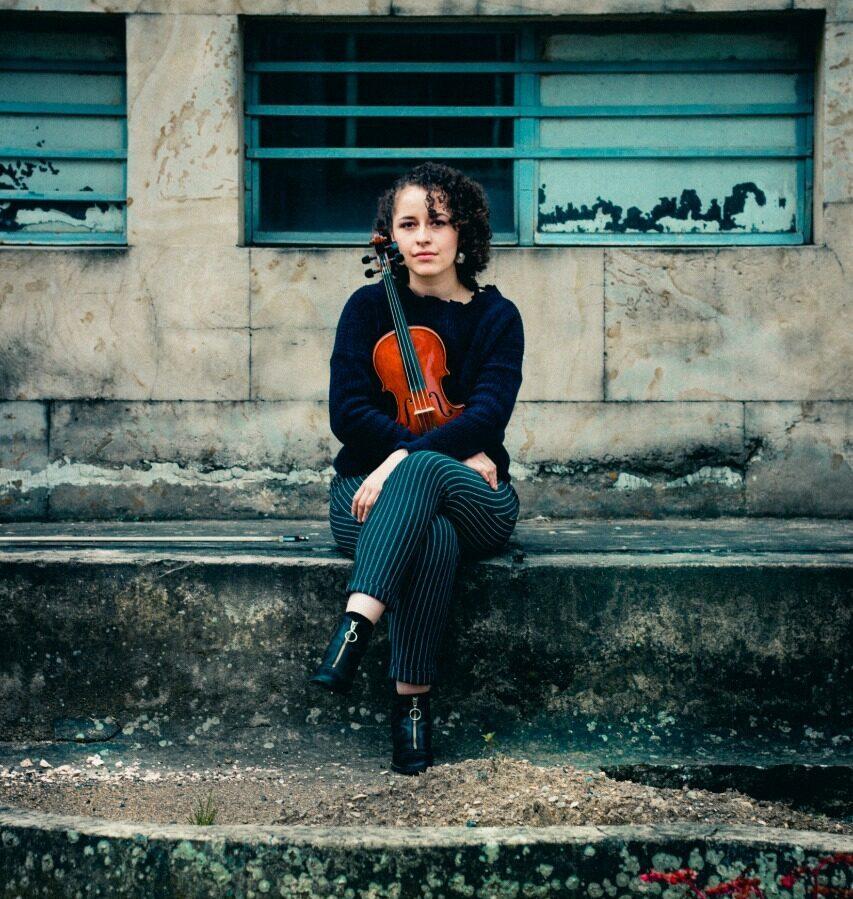
Inti Hayna is a master’s student at Kent State University in the School of Music, studying violin. Born and raised in Bogotá, Colombia, she’s been playing the violin since she was eight years old. After finishing her undergraduate program in Bogota, Inti began looking for universities to continue studying music. After looking for universities in America, taking all kinds of tests and assessments to enter a program within the country, she ended up coming to Kent.
She now performs with the KSU Orchestra, but her interests expand far beyond the concert hall. Inti also produces electronic music of her own, using computer software, the ocarina, other wind instruments, the violin, and her own voice. On March 1st of this year, she released her newest song, “La Rosa”, on all major music platforms, including Spotify and YouTube.
The song is a whirlwind of electronic notation, wailing violin and singing. “This song is for my parents, especially for my mom”, she said. “Both of my parents are individual artists. They’ve taught me so much about being strong, courageous, to express myself and do what I love. Sometimes things are difficult with money or family or all kinds of things. I just want to tell them that everything will be fine. Everything will work out, no matter what happens.”
Electronic music invigorates the body. Classical music inspires the mind. Combining these two genres is the foundation of much of Inti’s solo music. “La Rosa”, works both of these muscles
When asked how the song came to be, she said, “I was just doing something in my apartment when the first line just came to me. I’d made some of the music on the computer already, and then I started writing more and more after that. Then I recorded some stuff for my violin, and I could feel it all coming in, and got really, really excited.”
The creative process is often messy and unpredictable. First drafts are rarely what the artist has in his or her mind. “First, I just start with a noise. I listen to something, a beat or a note. If I like something, I’ll just continue following it. I don’t think about the outcome or the final thing. I don’t need to… I just keep working on it. I won’t delete any drafts. I keep them all, everything already composed, as a sort of base to work from. You get to see your process because the process is the most important thing, and to know the way that you learn.”
“When you’re listening to a song in your house, and nobody’s watching, you’re just being you”, Inti said. “You’re dancing, singing, jumping around and acting crazy. You’re not your worries or your fears or your schedule. The music finds a way inside yourself from your ears to your mind and into your heart. And I think that’s beautiful.”
“Music is entertainment, you know?”, Inti said. “But it also inspires people to do something, to move, to act. It’s easy, in university, when you’re practicing five, six hours every day, to forget that you’re not practicing for you. You’re practicing for other people. In my case, I’m studying classical music but also electronic music on my own. I’m an academic person, of course. But art is much deeper than studying something or trying to make something perfect. Music needs to make us feel emotion and to connect with each other.”
Some musicians that inspire her are Flume, Lost Frequencies, Robin Schulz, Bach, Mendelssohn, Ravel, and Chopin. She’s especially inspired by female Romantic composers and electronic artists. Electronic music is a predominantly male genre. She feels really inspired by female artists who’ve struck it big in the electronic music world. As an interdisciplinary female artist, Inti is bending artistic boundaries as well as societal norms with her passionate, go-getter style of celebratory music.